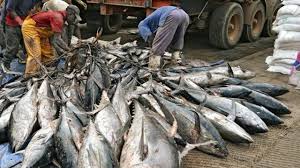Federal Government has pledged to halt Nigeria’s dependence on fish importation by enhancing local production and empowering youth and women in the fisheries sector.
Minister of Marine and Blue Economy, Adegboyega Oyetola, made this known on Wednesday in Abuja during a consultative meeting with Fisheries Cooperative Groups.
He outlined the government’s vision to transform aquaculture into a cornerstone of food security, job creation, and export competitiveness.
“The Federal Government is fully committed to supporting the fisheries and aquaculture subsector through policy, technical support, and financial inclusion. We will scale up domestic fish production, reduce dependency on imports, and reposition the sector for sustainable growth,” he said.
Oyetola emphasised that youth empowerment and increased participation in aquaculture are key to reducing unemployment and achieving national food security.
He reaffirmed the administration’s commitment to inclusive development, with specific initiatives already targeting youth and women.
He added that the ministry is actively engaging local and international partners to address existing industry gaps and revealed ongoing talks with the World Bank to provide financial support for fish farmers.
Additionally, the ministry is collaborating with the Nigerian Agricultural Insurance Corporation (NAIC) to offer affordable insurance and working with the Ministry of Water Resources to replicate the successful Oyan Dam aquaculture model across other regions.
“This meeting is only the beginning of a sustained and transformative dialogue. Integrated planning and inter-ministerial cooperation are key pillars of our strategy,” Oyetola said.
Permanent Secretary of the ministry, Olufemi Oloruntola, reiterated the government’s willingness to build strong partnerships with cooperative societies to ensure inclusive growth within the sector.
Earlier, President of the Fisheries Cooperative Federation of Nigeria (FCFN), Mashi Sani, proposed a Sustainable Livelihoods and Fish Food Security Initiative (SLESI), aimed at strengthening livelihoods across the fisheries value chain.
Sani proposed a N75 billion, three-year budget to generate one million jobs, reduce post-harvest losses by 50 per cent, and raise national fish production by 35 per cent.
He noted the sector’s critical role in food security, income generation, and nutrition, especially within rural communities. However, challenges such as overfishing, poor infrastructure, limited access to finance, and weak extension services persist.
Sani urged the Ministry of Marine and Blue Economy to adopt and fund the SLESI in collaboration with FCFN to ensure food security and drive the country’s blue economy.
He also called for targeted interventions to address ongoing issues such as poor transportation networks, limited market access, and inadequate technical support.
(NAN)


